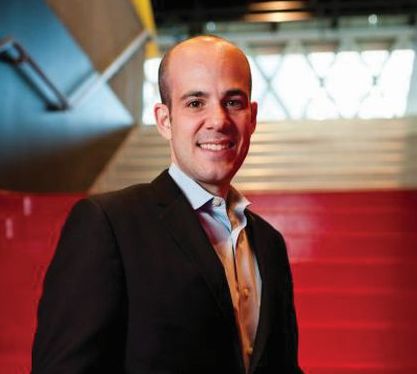Playful Workplaces Spark Creativity and Innovation
By Scott Steinberg
October 2022
PR professionals are tasked with crafting corporate messages, managing crises and working side-by-side with the world’s leading businesses. In other words, PR professionals perform serious, meaningful work.
At the same time, you may be surprised to learn that adopting a more joyful, lighthearted approach to their daily duties has the power to boost creativity, unleash imagination and deliver winning results. Likewise, it may also intrigue you to discover that championing a corporate culture that celebrates joy, wonder and curiosity also helps companies recruit top talent and design workplaces where diversity, equity and inclusion can thrive.
As co-author David Thomas and I recently discovered while researching our new book “FUN AT WORK,” embracing the art of play in the workplace can transform an organization by radically boosting its learning, development and innovation.
Being more fun and playful at work isn’t about exploring whimsical concepts just for fancy’s sake. Rather, encouraging employees to be imaginative within structured boundaries promotes flexible strategies, ingenious thinking and greater organizational resilience.
Play makes otherwise tedious business tasks more approachable, understandable and engaging. We found that when an organization introduces fun and play throughout its workplace, its employees become more motivated and engaged.
Creating an inspirational workplace
What values does your workplace champion? For many PR firms and departments, professionalism, accountability and customer service might spring to mind. But when it comes to the values that drew them to public relations in the first place, many PR pros may find that terms like curiosity, creativity and teamwork spring more readily to mind.
The disparity between the principles that PR firms champion and the values that drew professionals to the field reveals a disconnect in how many communications firms operate. Employers often prioritize goals such as profitability, performance and results. But a workplace that emphasizes greater productivity and profit at the expense of joy, wonder and delight doesn’t sound like a very fun place to work.
To create a workplace that employees will adore, with policies reimagined for the future of work, we need to shift our thinking to the bright side. And we don’t have to compromise to balance our practical concerns (the need to deliver tangible results to clients, for example) with more philosophical considerations such as organizational mission, purpose and culture. To build a culture of greatness in your company, start by rethinking your approach in four areas:
Creativity
By making our workplaces more playful, we can inspire the creativity we need to develop clever new campaign strategies, media pitches and business ideas.
Innovation
Shifting our thinking toward a more playful work environment also helps a PR department or firm’s ability to assess new concepts and put good ideas into motion.
Motivation
The creativity found in more playful workplaces also raises a company’s interest and desire to effect positive changes and get work done.
Engagement
By reimagining a PR workplace as more fun, we can also improve the team’s overall drive and ability to bring great ideas to life.
From Virgin Group founder Richard Branson’s willingness to dress like a female flight attendant to raise money for charity to DaVita Kidney Care making fun a corporate mandate, many brands have found success by taking a more playful approach in their workplaces. They use several common strategies:
• Give employees more room in their workday to playfully brainstorm, engage in unstructured thinking and ideate new concepts.
• Put systems in place that encourage the playful, creative thinking that allows organizations to more rapidly identify challenges and opportunities. A playful approach also helps employees quickly and cost-effectively experiment with new ideas and solutions to the challenges they uncover.
• Use a playful work approach to promote a culture of ownership and accountability, where workers are encouraged to think like “intrapreneurs” (entrepreneurial thinkers inside the organization). That way, they can consistently envision ways to tackle new challenges.
• Spark fun and creativity by using games and learning activities based on “what if?” scenarios that test strategies and solutions.
• Ask employees to role-play what competitors might do to gain an advantage over their company.
• Hold get-togethers and roundtables where employees of all experience levels, backgrounds and departments are invited to share ideas and test approaches.
• Use more playful approaches to learning and development, such as interactive games and simulations; short, offbeat or humorous videos, infographics and charts; and animated explainers. These fun tools boost audience attention, retention and learning.
As a keynote speaker and corporate trainer who’s helped more than 1,500 leading brands prepare to adapt to change and uncertainty, I’m often asked to run two popular workshop activities. One involves asking senior leaders to devise a strategy to address an urgent business objective, but then forcing them to alter those strategies by hitting them with an unexpected disruption (economic pullbacks, geopolitical volatility, regulatory complications, etc.) every five minutes.
In another popular workshop activity, I challenge senior leaders to imagine they work for a business competitor. They’re given an hour or less to brainstorm ideas for outmaneuvering and outperforming their current employer. Both activities are rooted in gamification.
Alternately, to see how powerful a shift in mindset the principles of fun and play can offer in minutes, try challenging PR pros to use business buzzwords such as “metaverse,” “web3,” or “employee empowerment” at your next corporate meeting. You may be surprised by how this simple business hack makes attendees more attentive, engaged and conversant.
Prompting employees to deliver more creativity and imagination also requires organizations to create safer, more permissive workspaces, with more opportunities for employees to speak up and make their voices heard. It means providing programs that invite others to assume leadership roles and offering more opportunities for interactive strategy planning and development. Permissive workspaces consistently invite fresh perspectives, opinions and ideas to the discussion table.
Happily, the more you embrace the principles of fun and play at work, the more productive and innovative your organization will become. You’ll soon discover that your employees are happier and more motivated, too.



